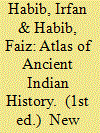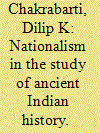| Srl | Item |
| 1 |
ID:
141398


|
|
|
|
|
| Edition |
1st ed.
|
| Publication |
New Delhi, Oxford University Press, 2012.
|
| Description |
xvii, 133p.: mapshbk
|
| Series |
Aligarh Historians Society Series
|
| Standard Number |
9780198065647
|
|
|
|
|
|
|
|
|
|
|
|
Copies: C:1/I:0,R:0,Q:0
Circulation
| Accession# | Call# | Current Location | Status | Policy | Location |
| 058351 | 912.54/HAB 058351 | Main | On Shelf | General | |
|
|
|
|
| 2 |
ID:
128547


|
|
|
| 3 |
ID:
186230


|
|
|
|
|
| Summary/Abstract |
The historiography of ancient India has been an ideological battleground since the
very beginning. The histories of ancient India written during the colonial period by
Europeans were heterogenous in nature. On the one hand, there were works with clear
imperialist imprint such as the ones by E J Rapson, and on the other hand, we have
the pioneering works of Vincent Smith, which are not as imperialist as they are made
out to be. The works of nationalist historians such as R K Mukherji, R C Majumdar, U
N Ghoshal and others were mainly in response to works like those of Rapson. These
pioneering historians of the late 19th and the first half of the 20th century have been
characterized as “Hindu revivalists” by a section of later Indian historians who mostly
belong to the Communist fold. The purpose of the present paper is to put this accusation
in the context of the history of research on ancient Indian history and archaeology
and judge if this is at all true or merely a communist propaganda and ploy to build up
a ‘progressive’ versus ‘obscurantist’ divide among the historians of ancient India. The
paper will also examine how certain currents of thought in modern Indian archaeology
pose a danger to Indian security.
|
|
|
|
|
|
|
|
|
|
|
|
|
|
|
|
| 4 |
ID:
148883


|
|
|
|
|
| Summary/Abstract |
The basic notions of history inherited by western academia were
influenced by what was regarded as “common sense” knowledge, even
though it was explicitly or subconsciously shaped by Biblical
chronologies and the time “ceiling” that they set for the creation of the
world. Nineteenth century positivists beginning with Auguste Comte
built a theory of evolutionary progress starting from early religious
societies, transiting through philosophically motivated ones and rising
towards the ultimate scientific stage of human rationality. Both socialists
and liberal thinkers generally held on to that vision of linear growth
from quasi-animal origins through ever higher stages of intellectual
complexity, industrialization and knowledge.
|
|
|
|
|
|
|
|
|
|
|
|
|
|
|
|